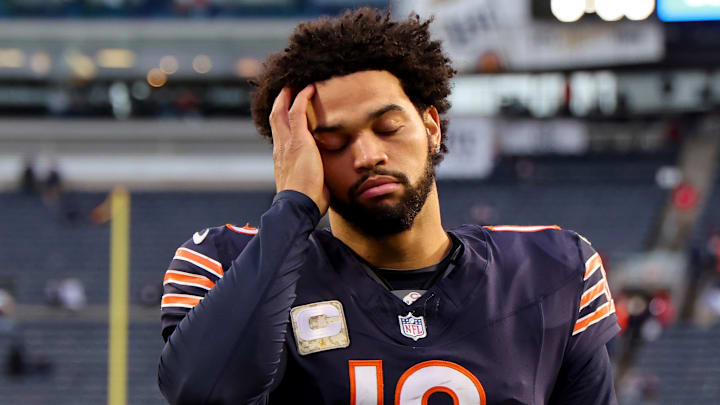Chicago Bears rookie quarterback Caleb Williams has reached the low point of his early professional football career. He's struggled mightily recently, failing to throw a touchdown in three straight games — throwing for 131 yards or fewer in two of them.
Uncoincidentally, the Bears have lost their last three contests. It's a messy situation in Chicago, though everyone but Williams is being held accountable. Recent scrutiny and attention have been directed toward the team's offensive line, with many saying the pass-blocking unit has failed to keep him upright. Be that as it may, the advanced metrics tell a different story.
Per NFL's Next Gen Stats, Williams' 2.9-second average throw time ranks 25th in the league ($). Moreover, his pass-catchers are generating a 3.6 percent target separation rate, which is good for 10th. So, not only is the former Heisman Trophy winner's protection holding up for long enough to get the ball out, but pass-catchers are getting open.
Advanced metrics show Caleb Williams should be handling Bears OL troubles better
Meanwhile, quarterbacks like the Seattle Seahawks' Geno Smith and C.J. Stroud of the Houston Texans are doing more with less. They're each getting pressured on a higher share of their dropbacks than Williams (40 percent). Regardless, both have taken fewer sacks per game than the Bears' signal-caller.
What excuse do the Bears have now for Williams? While they haven't necessarily fared well in the trenches, it hasn't been the main issue. At what point does Chicago realize they're running out of scapegoats and that this year's No. 1 pick is part of the problem?
First, the Bears dismissed offensive coordinator Shane Waldron, and head coach Matt Eberflus could be next, considering his seat is getting hotter daily. Suddenly, the offensive line has caught strays, with little mention of Williams.
Obviously, Chicago can't fire Williams, who they invested greatly to be their long-term face of the franchise. Yet, he's not the first rookie passer to play behind a mediocre offensive line and presumably won't be the last. Ultimately, his ability to see the field properly and avoid pressure is sorely lacking.
